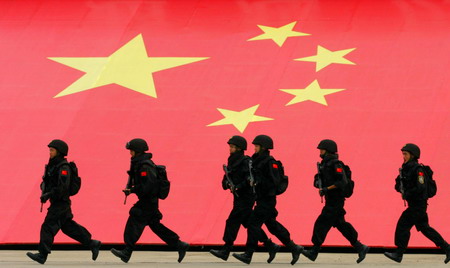China is tightening security with tens of thousands of armed policemen guarding major facilities and streets during the country's 60th founding anniversary, which falls on Oct. 1.
Several thousands of Chinese People's Armed Police Force (PAPF) troops will make security checks, and guard against and handle any terrorist attacks in Beijing, center stage of the celebrations scheduled around the National Day.
 |
|
Armed policemen in Beijing taking part in a ceremony on September 1 that marks the start of their deployment in Beijing to ensure security during the upcoming National Day celebrations for the 60th anniversary of the founding of the People's Republic of China. [Xinhua]
|
The PAPF headquarters have selected elite members from its rapid responding units and troops under direct control to guard the capital.
A statement issued by headquarters of the PAPF, China's internal security force, on Wednesday revealed that armed police troops garrisoned in Tibet and Xinjiang have been involved in maintaining stability in the regions where security levels are particularly intensified.
Shanghai, where the World Expo will be held next year, is also targeted by the PAPF to protect against possible security threats or attacks, according to a statement.
Besides the four prioritized regions, armed police troops in Tianjin, Hebei, Shanxi, Inner Mongolia, Liaoning and Shandong, which surround Beijing, have also been ordered to tighten security measures and to act as the capital's moat.
Gen. Wu Shuangzhan, commander of the 660,000-strong PAPF, asked the troops to prepare for the worst situations with detailed plans and high-pressure special training.
Under the dual command of the Central Military Commission (CMC) and the State Council, the armed police played a major role in quelling riots and maintaining stability in Lhasa on March 14 last year and in Urumqi on July 5.
China's national legislators last week approved the country's first law on the PAPF to officially authorize the force the power to handle terrorist attacks and other social emergencies.